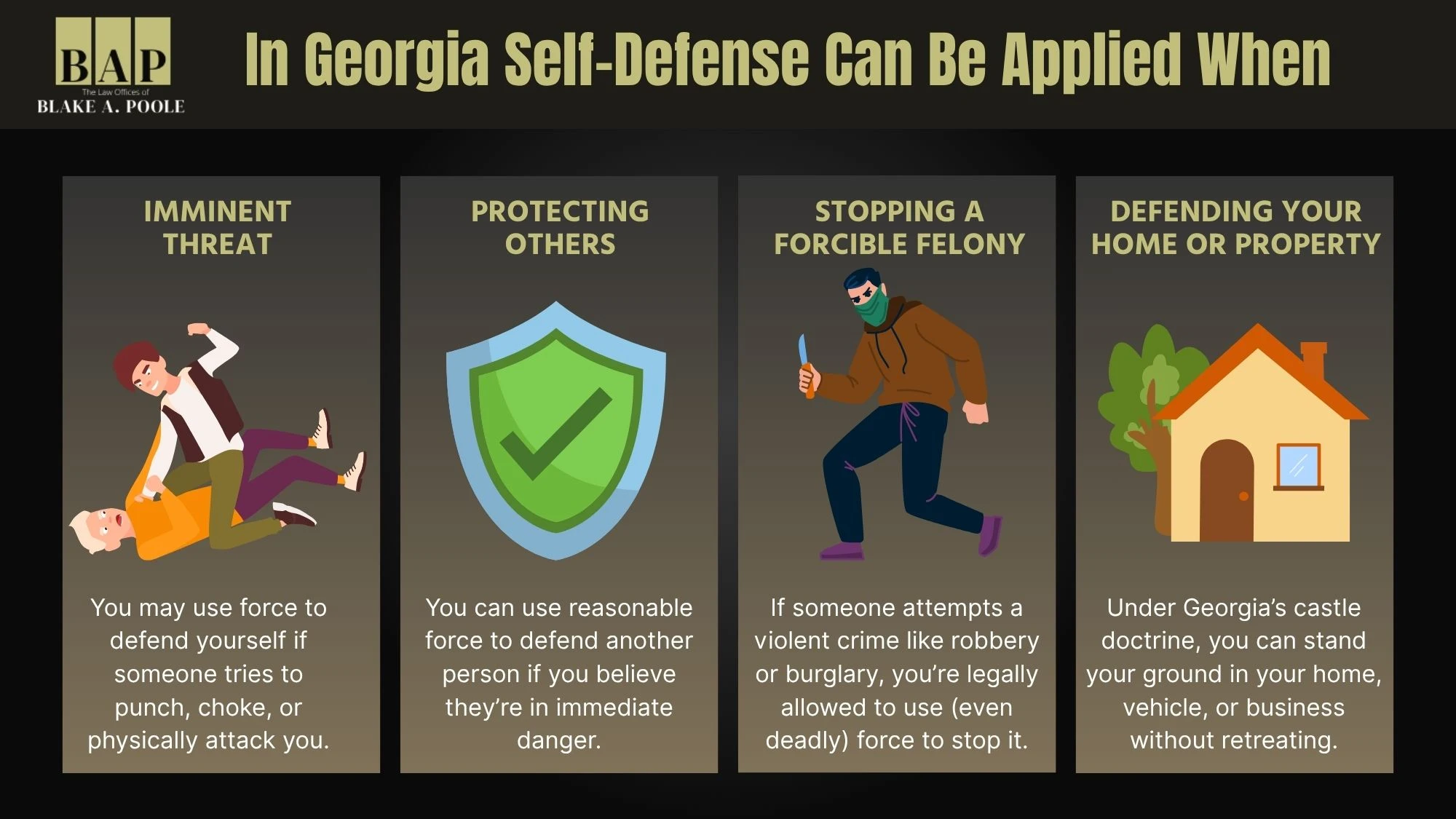August 4, 2025
By Blake A.Pool
Free Consultations
|
24/7 for Emergency Help
.avif)
November 6, 2025
By Blake A. Poole
Getting charged with assault in Georgia doesn’t always mean you’re guilty of a crime. Sometimes, what looks like aggression is actually an attempt to defend yourself or someone else. But when does self-defense apply, and when does it go too far under Georgia law? Understanding the difference can mean the distinction between a conviction and a cleared name.
In Georgia, self-defense isn’t an excuse but a legal right. The law allows you to use reasonable force to protect yourself, others, or your property from imminent danger or unlawful force.
According to O.C.G.A. §16-3-21, a person is justified in using force against another when they reasonably believe such force is necessary to prevent death, serious bodily harm, or the commission of a forcible felony like robbery or rape.
That “reasonable belief” standard is key. The law doesn’t require that a threat actually exist. It only requires that a reasonable person in the same situation would believe there was an immediate threat of harm.

Self-defense can apply in many situations, including:
These laws make it clear that you don’t have a duty to retreat in Georgia. Thanks to the Stand Your Ground law, if you’re lawfully present in a location, you can defend yourself without backing away first.
While Georgia’s self-defense laws are broad, they aren’t limitless. Self-defense no longer applies if you become the initial aggressor, use unreasonable force, or continue attacking after the threat is gone.
You cannot claim self-defense if:
In short, you can defend yourself, but you must stop once the immediate threat has ended.
Georgia law permits deadly force only when you reasonably believe it’s necessary to prevent death, serious bodily injury, or a forcible felony. The use of such force must match the severity of the threat.
For example:
Every self-defense situation is unique, and prosecutors often examine the circumstances surrounding the event, including your actions before, during, and after the incident, to determine whether your response was justified or not.
To claim self-defense, your attorney must show there was a reasonable belief of danger and that your response was proportionate. Key evidence might include:
Having an experienced criminal defense attorney from our team is critical; we know how to present evidence that supports your version of events and challenges the state’s case.
If you’re facing criminal charges for assault after defending yourself, do not try to explain your case directly to the police or prosecutors. Anything you say can be used against you. Instead:
Georgia law recognizes your right to defend yourself, but the legal system doesn’t always make it easy to prove. If you acted in self-defense and now face assault or aggravated assault charges, you need a strong legal defense to show that you were protecting yourself, not committing a crime.
At The Law Offices of Blake A. Poole, we understand how Georgia’s self-defense laws work and how to build a compelling case that protects your freedom. Our team investigates every detail, challenges the prosecution’s claims, and fights to ensure your side of the story is heard. Contact us for a free consultation.
Don't face criminal charges alone. Our experienced defense team is available 24/7 to protect your rights and fight for your future.
Our expert attorneys may be able to prove your actions were lawful self-defense. Don’t face assault charges alone. Contact our dedicated team to learn about your rights and assert your defense.
Lorem ipsum dolor sit amet, consectetur adipiscing elit. Suspendisse varius enim in eros elementum tristique. Duis cursus, mi quis viverra ornare, eros dolor interdum nulla, ut commodo diam libero vitae erat. Aenean faucibus nibh et justo cursus id rutrum lorem imperdiet. Nunc ut sem vitae risus tristique posuere.
We begin working immediately to preserve evidence, interview witnesses, and file necessary motions. Early intervention often prevents charges from being filed or reduces their severity.
You have only 30 days to challenge your license suspension. Every day you wait makes it harder to build a strong defense. Call now!
Block Quote